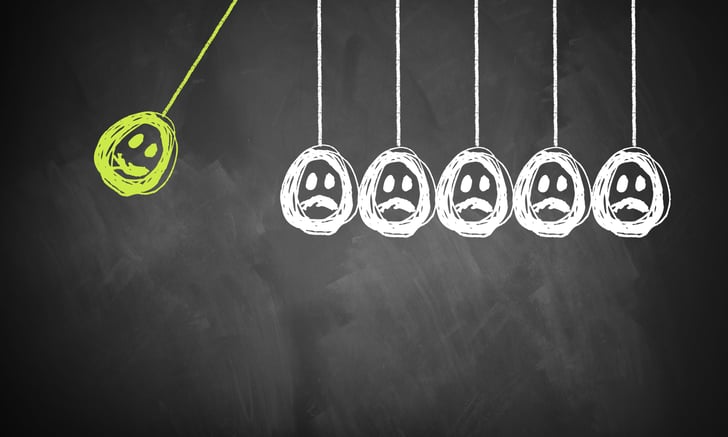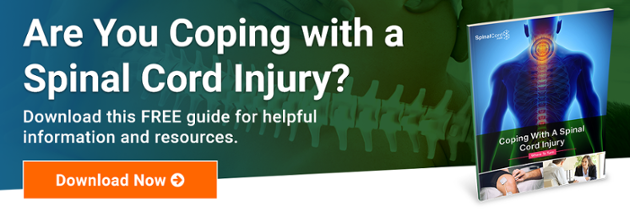Getting Through the Phases of Grieving after a Spinal Cord Injury

The days, weeks and months after your spinal cord injury (SCI) are the most difficult. You may be dealing with physical pain, the loss of abilities, as well as the mental and emotional tolls that this type of injury can take as you struggle to make sense of what has happened to you. You may feel like you are losing important parts of your life and freedom if you’ve become paralyzed.
You also may feel a swirl of feelings and emotions you can’t quite put into words:
- Anger because the situation that was beyond your control. You were obeying the law when the other driver ran a red light and hit you.
- Helplessness or uselessness because your injury has left you paralyzed or with a loss of sensory or motor functions.
- Frustration or depression because you are no longer as independent as you were before the accident; and perhaps because you can’t adequately express what you’re going through to family and friends.
- Hurt or feelings of emotional loss because your relationship with your spouse, children, friends or loved ones is now different; because they don’t understand what you’re going through.
- Fear that you may never be able to fully recover and go back to the way your life used to be, or about what your future will be if you don’t recover.
Just remember that it’s okay to feel what you feel; that no one has a right to judge you for feeling any or all of these emotions. It also is important that you know that you are not alone. There are approximately 17,000 new spinal cord injuries reported each year and, as of 2016, it was estimated that between 243,000 and 347,000 people were living with a spinal cord injury. Additionally, “there are nearly six million Americans living with some form of paralysis (stroke, SCI, MS, ALS, etc.),” according to the Christopher & Dana Reeve Foundation.
While many people associate psychiatrist Elisabeth Kübler-Ross’s well-known Five Stages of Grief with families and friends coping with the loss of a loved one, the stages were originally designed to identify the periods of grief that are experienced by someone with a terminal illness. However, not everyone experiences all of these stages — or may skip some altogether or experience different forms of grief — so we’re going to use them here as simply general guidelines.
Below are the Five Stages of Grief and what you can do to get through them.
1: Denial
When someone has suffered a recent traumatic injury, it’s understandable that they may not initially be willing to accept what has happened. In fact, they may find themselves feeling confused and unwilling to deal with the reality of the situation. These are not necessarily unusual responses; they are coping mechanisms — your brain’s way of protecting itself and giving it time to slowly begin processing what happened without being overwhelmed.
After a traumatic event or a serious injury, you may find yourself behaving or reacting differently — if you were outgoing and extroverted, you may find yourself becoming more introverted; and if you were introverted, you may find yourself becoming more outspoken or aggressive.
What to do: Remember that you are still alive and that your life isn’t over. While, yes, it is now very different from what it was previously, that doesn’t mean you can’t discover new ways to live it. Recognize that feelings of happiness, contentment, and fulfillment are still within your reach. Take the time to sit down and talk with your doctor to begin to learn about your injury and create a recovery plan together.
2: Anger
Anger is a normal response to a severe or debilitating injury, particularly if the situation that caused the injury was beyond your control. You may find yourself wondering why, when you had the right of way when the other driver hit you, you the one left suffering like this. It’s just not fair. You may feel like you want to hold onto that anger because it helps you to realize that you are at least feeling something. However, it is important to try to find a way to positively channel those negative emotions.
What to do: Dealing with your answer requires acknowledging and coming to terms with the fact that your life is now different. You are now different. Try to take those strong feelings and express them in a safe way. It’s easy to fall into a mindset of negativity when you’re in the middle of difficult circumstances; it’s a lot more challenging to find something to find a way to express them in a potentially positive way.
3: Bargaining
At this stage, you find yourself starting to try to come to terms with what has happened to you. As such, it is human nature to wish that you could bargain away your pain with a doctor or some form of higher power; to change your circumstances and return your life to how it used to be. You also may find yourself dwelling on the cause of your injury, wondering what you could have done differently to have prevented the accident.
What to do: Focus on what you can do to aid your recovery. Take some time to research and learn more about your injury and all that it entails; use reputable spinal cord injury resources to empower yourself with knowledge. Actively engage in your spinal cord injury treatment regimen, occupational and physical therapies, and counseling sessions. After all, this is your future you’re talking about — give these efforts everything you’ve got to help make your fullest recovery possible.
4: Depression
In the weeks, months, or even years after an SCI, you may find yourself feeling depressed. Feeling some depression is a normal response to this type of life-changing injury, as you are, in a sense, mourning the loss of certain abilities. Adjusting to paralysis or loss of other physical functions is a process that takes time and requires a change in thoughts and feelings. Depression can have a toll on your mind and body, exacerbating physical or psychological symptoms or pain, increase fatigue, and make you lose sleep.
What to do: When you feel yourself starting down that downward emotional slope, that is when you need to find new ways to redirect yourself and your thoughts toward something positive or productive. Take the time to discover a new hobby or activity of interest. Plan some simple short-term goals that you can complete, helping you to gain a sense of accomplishment and feelings of productivity.
Depression is a serious medical disorder. If this feeling of depression continues or increases, be sure to speak with your medical provider about treatment options. If left untreated, it can lead to decreased functional independence, greater risk of medical complications, and an array of other issues.
Go online to meet and get to know other SCI survivors. Finding someone who understands what you’re going through or has already been where you are now can help by providing support, helpful tips for daily activities, and just by being there to talk to about your experiences. This type of activity can contribute to your overall recovery and mental health.
5: Acceptance
While this is not the final step on your road to rebuilding your life, accepting what has happened to you and making the necessary adaptations are crucial to your overall well-being and recovery. Part of this stage may be discovering and learning what your limitations are and how best to live with them. Once you reach this step, you will be able to experience life in a whole new way.
If you find yourself in any of these stages or struggling with your injury, be sure to check out our free resource guide “Coping with a Spinal Cord Injury: Where Should You Turn?”
Stay Updated on Advancements On Traumatic Brain &
Spinal Cord Injuries
About the Author





